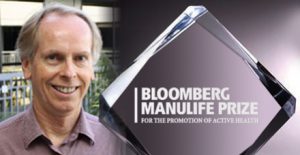
By McGill Reporter Staff
McGill, in association with Lawrence S. Bloomberg and Manulife Financial, announced that Dr. James Sallis, Distinguished Professor of Family & Preventive Medicine at the University of California, San Diego, is the winner of the 2012 Bloomberg Manulife Prize for the Promotion of Active Health.
Widely regarded as a leading expert on human behavior and its influence on fitness, Dr. Sallis began his career investigating how to successfully encourage individuals to incorporate physical activity into their lives. Sallis quickly realized that, although people could often be influenced to adapt their routines to include regular exercise, such changes were rarely permanent, and within six to 12 months people would revert back to their original, unhealthier habits.
This realization led Sallis to the question that would form the foundation of his acclaimed research: what are the root causes of inactivity, and how does the urban environment we live in — and in particular the layout of our cities and neighborhoods — make it easier or more difficult to stay in shape?
“The role that our physical environment plays in our ability to stay fit is one of the areas of research in the field of active health which has been completely overlooked until very recently, and so we are delighted to honour Dr. James Sallis, whose studies are having a significant impact in helping us understand this crucial link between the built environment and the barriers they present to healthy living,” said Helene Perrault, Dean of the Faculty of Education.
Perrault said the jury, made up of leading academics from the field of active health, was most impressed by Sallis’s efforts to take his research findings beyond the laboratory and turn them into practical applications. For example, through the Built Environment Assessment Training (BEAT) Institute, he has helped create a free, online course that teaches researchers, policy-makers and others how to assess their local environment —including streetscapes, parks and trails — for physical activity.
Dr. Sallis has also presented his findings to legislators and other policy leaders, including members of the U.S. Congress, First Lady Michelle Obama and former California Governor Arnold Schwarzenegger – part of an effort to affect policy change through evidence-based research.
In addition to his academic appointment at UCSD, Dr. Sallis also serves as the director of the Active Living Research Program, funded by the Robert Wood Johnson Foundation; he has been recognized with numerous honours and awards, including a Distinguished Service Award from the Society of Behavioral Medicine, the Vice Presidency of the American College of Sports Medicine, and a Lifetime Achievement Award from the President’s Council on Fitness, Sports, and Nutrition.
Launched in May 2011, the $50,000 Bloomberg Manulife Prize is awarded annually to a researcher whose work promises to broaden our understanding of how physical activity, nutrition or psychosocial factors influence personal health and well being.
Last year’s inaugural winner was Dr. Steven Blair of the University of South Carolina, who was among the first researchers to show that even moderate increases in fitness, regardless of one’s weight, can translate into significantly reduced mortality rates.
The prize was the brainchild of Toronto financier and McGill alumnus Lawrence S. Bloomberg, MBA ‘65, chair of the Board of Directors of BloombergSen Inc. and recently appointed Chancellor of Ryerson University. To better educate Canadians on issues of health and lifestyle, and to promote positive shifts in behaviour, Mr. Bloomberg joined forces with corporate partner Manulife Financial, with each pledging funds to set up this 10-year initiative.
This year, four of Canada’s leading health organizations have joined the initiative: the Canadian Cancer Society, which is providing financial support to help promote the Prize, as well as the Heart and Stroke Foundation, ParticipACTION, and the Canadian Diabetes Association, who are providing in-kind support and opportunities for collaboration.
“The goal of the Bloomberg Manulife Prize is to honour research that has the potential to have transformative impacts on how people approach their health and wellbeing,” said Bloomberg. “These new health partnerships are a wonderful endorsement. We are honoured that many of Canada’s largest health organizations are excited to work with us in promoting this important goal.”
“Manulife is very proud to support the important and forward-thinking work being done by Dr. Sallis,” adds Nicole Boivin, Chief Branding and Communications Officer at Manulife Financial. “We have a long history of supporting causes that improve people’s health and well-being and this award is a tangible step in the fight against some of the most common health issues being faced by our citizens.”
Dr. Sallis will accept the prize at a special ceremony at the MaRS Centre in Toronto on Monday, Jan. 21, where he will also take part in a conversation about his research. This will be followed by a round table discussion on Wednesday, Jan. 23 at McGill, where local experts will join the prizewinner to explore the topic of the built environment and active health in greater depth.
The Bloomberg Manulife Fund also awards two research fellowships annually, valued at $22,500 each, to PhD students who show exceptional promise in their field. These recipients will undertake research projects at McGill’s Department of Kinesiology and Physical Education. This year’s fellowship winners are Hiram Cantu, a biomedical engineering graduate from Mexico who is studying movement difficulties in Parkinson’s patients, and sports psychologist William Falcao from Brazil, who studies and develops athlete training activities that promote health, education, and empowerment for women.

I would like James and all interested in this subject to review my city concept for future transport with emphasis on walking & cycling but going beyond with speed, dignity, & economy. http://www.RenataProject.com